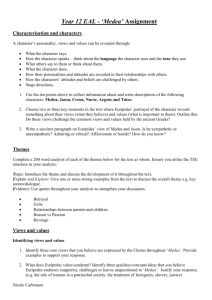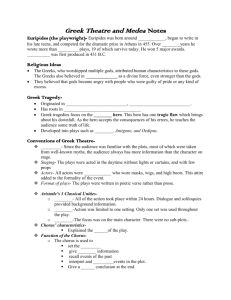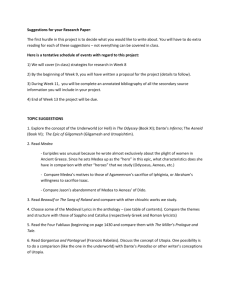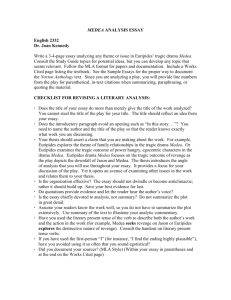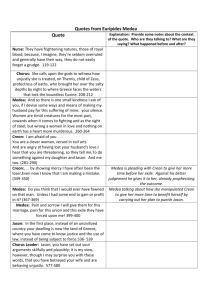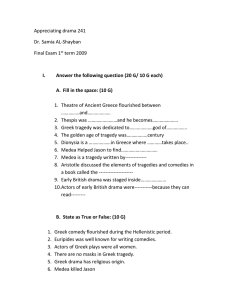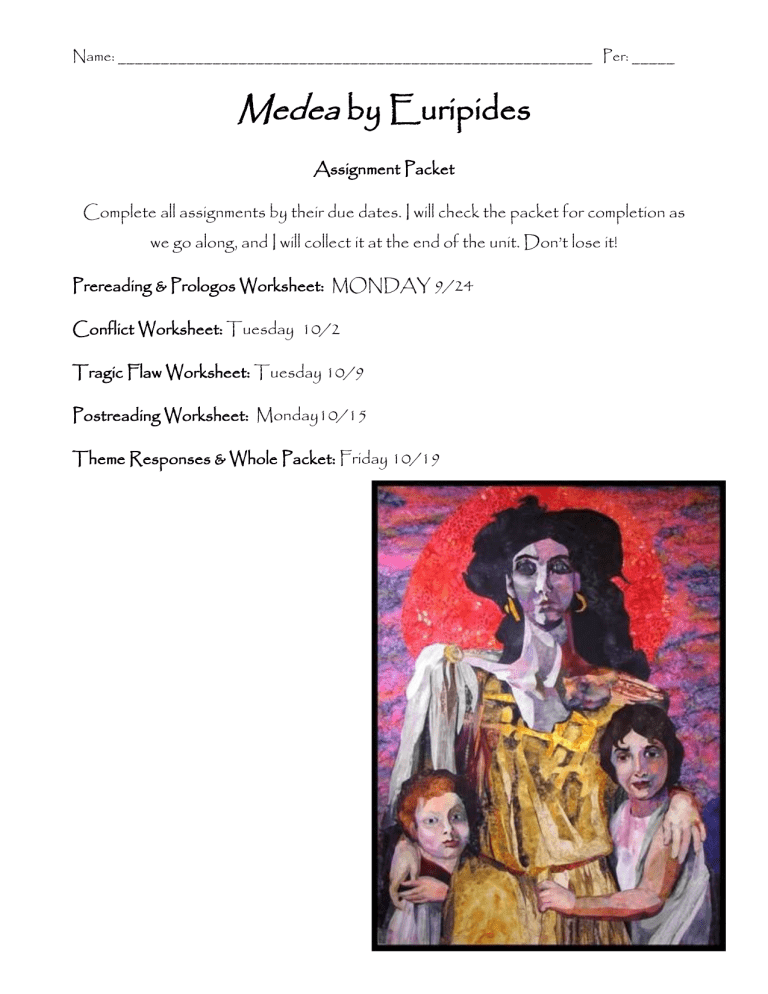
Name: _______________________________________________________ Per: _____ Medea by Euripides Assignment Packet Complete all assignments by their due dates. I will check the packet for completion as we go along, and I will collect it at the end of the unit. Don’t lose it! Prereading & Prologos Worksheet: MONDAY 9/24 Conflict Worksheet: Tuesday 10/2 Tragic Flaw Worksheet: Tuesday 10/9 Postreading Worksheet: Monday10/15 Theme Responses & Whole Packet: Friday 10/19 Brief Note on the Mythological Background to Euripides' Medea [The notes have been prepared by Ian Johnston of Malaspina University-College, Nanaimo, BC, Canada. This text is in the public realm and may be used by anyone, in whole or in part, without permission and without charge, provided the source is acknowledged. Last revised June 2002] Jason was born the son of Aeson, in Iolcus. When his father lost the kingship, Jason was secretly given the famous centaur Chiron, who raised him. As a young man Jason returned to Iolcus. The king, Pelias (the man who had deprived Aeson of the kingship) was afraid that Jason would usurp him, so he persuaded Jason to set off on an expedition to capture the Golden Fleece, the pure gold skin of a ram which was in a sacred grove in Colchis (a barbarian region to the east of the Euxine Sea, the Greek name for the Black Sea), where it was guarded by a dragon. Jason put together a band of adventurers called the Argonauts, among whom were some major figures of Greek mythology (e.g., Hercules, Orpheus). They took their name from the ship they sailed in, the Argo. The heroes had a number of adventures on the way to Colchis, including passing through the legendary Clashing Rocks (the Symplegades). Upon arrival in Colchis, King Aeetes set them a number of tasks, including yoking two fire-breathing bulls, ploughing a field with them, sowing the field with teeth from the dragon of Cadmus, and then fighting against the warriors who arose from the sown teeth. To complete these tasks Jason enlisted the help of Medea, daughter of King Aeetes. She fell in love with Jason and helped him with her magic to complete the tasks set by Aeetes and to steal the Golden Fleece. She then escaped with Jason, killing her brother in order to scatter his body on the sea so that Aeetes would have to hold up his pursuit of Jason and Medea. In order to understand Euripides' play, it is essential to recognize that Medea, in addition to being a female with magical powers, is also a barbarian (i.e., non-Greek). Jason and Medea returned to Iolcus, where Medea's magic restored Jason's father, Aeson, to youthful health. Medea also persuaded the daughters of King Pelias to kill their father by giving them ineffective medications and persuading them to try a treatment which was fatal. When Jason and Medea moved to Corinth, Jason abandoned her in order to marry Glauce, daughter of the king, Creon. Medea's revenge is the subject of Euripides' play. In order to protect herself, Medea arranged a secure haven for herself with Aegeus, king of Athens. Medea then killed Glauce and Creon and her own two children (who are not named in the play). Subsequently, Medea moved to Athens and married Aegeus, the king. But she became jealous of Aegeus' son Theseus. She then returned to Colchis. Jason's life ended when he was hit by part of the stern of the Argo as he lay asleep under it. The adventures of the Argonauts formed a fecund source for Greek story-tellers, poets, dramatists, and painters. Jason's various love affairs have also made their way into many fictions. And Medea has always been a popular figure in fiction and drama. Euripedes Biography from http://www.theatrehistory.com/ancient/euripides001.html Euripides (480-406 B.C.) was a misunderstood genius. His classic Medea got totally dissed in its time. It came in third place at the annual Athenian play competition at the Theatre of Dionysus. "Third place," you might say, "that's not tooo too bad." Yeah, except that, as usual, there were only two other playwrights competing. Euripides got trounced by his old rival, Sophocles, and Euphorion, the son of Aeschylus. Medea's bronze medal probably came as no surprise to Euripides. He is said to be the author of around 92 plays, but he only won the competition five times. Euripides didn't even get to enjoy the final win. The prize (for The Bacchae) was awarded after his death. To add insult to injury, Euripides died by being ripped apart by a pack of wild Macedonian dogs. Some scholars say that this story of his death is totally fictional. We hope they're right. Poor Euripides was always getting picked on. Aristophanes lampooned him mercilessly. The comic playwright made fun of Euripides's use of language and his characters' tendency to spout the new fangled philosophies of Socrates. Like his buddy Socrates, Euripides's ideas were hard for mainstream Athens to swallow. This was due in part to his progressive ideas. The guy was anti-war, sympathetic to slaves and women, and so critical of traditional religion that many believed him to be an atheist. Athens just wasn't ready for these "liberal" ideas. Euripides was known to be kind of a loner. He spent most of his time writing in a cave on the island of Salamis. Eventually the lack of appreciation and disgust with Athenian politics (especially the destructive Peloponnesian War) may well have been what drove Euripides to leave Athens. He spent the last months of his life in the court of the King of Macedonia, where he proved them all wrong by penning his undisputed classic, The Bacchae, and perhaps met a pack of dogs with a taste for playwrights. In Poetics, Aristotle rates Euripides as much a lesser tragedian than Sophocles, pointing out his haphazard plots and un-heroic heroes. These criticisms are valid (both are true in Medea), but we wonder if Aristotle ever stopped to think that Euripides had another agenda altogether. While his rival Sophocles was towing the traditional line, Euripides was busy inventing entirely new genres. In retrospect, we can see that it wasn't necessarily that Euripides didn't know how to write a traditional tragedy; he was just dissatisfied with the form altogether. By blending comic elements with tragic, Euripides basically created Tragicomedy genre. His loosely plotted plays with happy endings created the genre of Romance. And, of course, there's Medea, which revolutionized Revenge Tragedies by letting its heroine off the hook. On top of all that, Euripides's focus on the emotional lives of his characters, along with his comparatively natural-sounding dialogue, foreshadowed by thousands of years the creation of modern realism. History has vindicated Euripides. More of his plays are extant (still around) than any other ancient Greek playwright. Medea is now recognized as a timeless classic, while the two plays that beat it in the original competition don't even exist anymore. Euripides is now known as one of the greatest and most innovative playwrights to ever walk the Earth. We're glad the man has finally gotten his due – he was basically a one man dramatic revolution. Name: _______________________________________________________ Per: _____ Medea Prereading And Prologos (p. 302-304) Answer in complete sentences. 1. Before the play begins, what are your impressions of Jason and Medea? 2. Explain the Nurse’s attitude toward Jason. Include at least one direct quote to support your answer. 3. Why were Jason and Medea forced to leave Iolchus? 4. We do not see Medea in the Prologos; we merely hear her voice. What is your first impression of her based on these words? 5. The children have no speaking lines here. Nevertheless, they are an integral part of the Prologos and an important topic of conversation. Examine the Nurse’s and Medea’s references to the. What is being foreshadowed, and how can you tell? Medea Themes Cheat Sheet Theme of Women and Femininity Medea sharply criticizes the male-dominated society of its time. Its protagonist is a radical anti-heroine who continues to inspire both admiration and fear. We sympathize with Medea's downtrodden state and applaud her strength and intelligence. However, her bloody and vengeful rebellion shocks and unsettles audiences even to this day. The play can be seen as a cautionary tale to oppressors as well as the oppressed. Theme of Revenge Medea's relentless pursuit of vengeance is legendary. She is driven by a passionate desire to right the wrongs done to her and sacrifices even her own children in the pursuit of satisfaction. Medea shows audiences the horror that can come when a person lets desire for revenge rule her life. Euripides's play helped pave the way for many later revenge tragedies, from the numerous Spanish revenge dramas to Shakespeare's Hamlet. Theme of Betrayal All the violence and terror in Medea is caused by Jason's betrayal of his wife Medea. Her sheer rage at his unfaithfulness drives her to commit horrific acts of bloody revenge. Ironically, Medea's fury at her husband's betrayal drives her to the use of trickery and manipulation, which are really just another form of betrayal. Medea shows how, when one person betrays another, all may be corrupted. Theme of Exile Medea is laced throughout with the theme of exile. All the characters relate to the motif. Some, like Medea, have been banished from their homes; some are the ones doing the banishing. The theme of exile would have resonated strongly with Euripides's audience of ancient Athenians. Their city-state was their lives. The thought of being cut off from it and cast out into the wilderness would have been terrifying. Theme of Foreignness and 'The Other' Ancient Greeks had a deep suspicion of foreigners, thinking of them all as "barbarians." With Medea, Euripides seems to confront this prejudice by choosing to honor a foreigner with the role of tragic heroine and by making her the most intelligent character in the play. However, the playwright also confirms many Greek stereotypes of foreigners by making Medea wild, overly passionate, and vengeful. Theme of Marriage Medea is an extreme depiction of just how bad a marriage can go. It really doesn't get much worse than the marriage seen in this play. When Jason takes a new wife, Medea, his former wife takes revenge by killing four people, including their two sons. Indeed, the play doesn't exactly have a bright outlook on matrimony. In Medea the severing of a marriage releases the same destructive force as the sundered atom of a nuclear bomb. Theme of Cunning and Cleverness Medea is symbolic of the clever woman imprisoned in a world of men. Her intelligence inspires both suspicion and cautious admiration. In the end, her cunning becomes her supreme weapon in her quest for revenge. None of her enemies stand a chance against her supreme intellect. Medea shows that, without a doubt, the greatest power lies in knowledge. Theme of Love Aphrodite, Goddess of Love, is not very well appreciated in Euripides's Medea. Everywhere her hand is seen, destruction swiftly follows. Whether the love be romantic, paternal, or maternal, it always leads to death and despair. Quite often the characters even go so far as to beg the goddess to spare them the pains that love can bring. Overall, Medea seems to present a rather cynical view of the tenderest of emotions. Name: _______________________________________________________ Per: _____ Conflict: Medea vs. Jason, the Debate Fill in the chart below with Jason’s relevant responses to Medea’s argument. Cite each response with page numbers. Medea “I saved your life; every Greek who sailed with you on the Argo knows I saved you, When you were sent to tame the fire-breathing bulls and to yoke them, and to sow the deadly fields…” “Had you not been a coward, Jason, you would have spoken frankly to me first, and not concealed your wedding plans from the one who loved you.” “… you thought it might not be altogether proper, as you grew older, to have a foreign wife.” “You at least have a home to turn to. But I am going into exile, and alone.” “How so? By marrying and deserting you?” “I’ll accept nothing from you….” Who has the most convincing arguments? Why? Jason Name: _______________________________________________________ Per: _____ Medea: The Tragic Flaw Give one example that demonstrates each flaw. These may Medea’s statements or actions or facts learned about her from other characters. You must cite the page number where you found the example, but you can put the example in your own words. Flaw Example Page # Hubris (excessive pride) Self-will Rashness Excessively passionate nature Need for revenge A tragic flaw, or harmartia, brings out the character’s humanity and enables the audience or reader to view him or her with compassion. Given this information, which of the above weaknesses qualifies as a tragic flaw? Explain. Name: _______________________________________________________ Per: _____ Medea Postreading Answer in complete sentences 1. Medea dramatically changes her attitude toward Jason when she begs his forveness. Why does Jason believe her? Cite passages to support your answer. 2. How does Euripides introduce suspense in the scene where Medea sends the children off to the royal palace with their father? 3. When the tutor reports the success of the children at the royal palace, why does Medea exhibit such anguish? 4. After the news from the tutor, Medea’s resolve to continue with her plan is momentarily weakened. What powerful aspect in Medea’s character restrains her from abandoning her plans? Cite passages to support your answer. 5. Directors often set Greek tragedies in another place and time other than Ancient Greece. If you were directing, where and when would you choose? Why? Medea Theme Questions Choose ONE question about each theme to respond to in a brief paragraph. Type your responses in MLA format and include cited textual support for your answers. You should have 8 responses total. You will need to clearly label the Theme as well as the number you are responding to. Also, your document must be uploaded to Turnitin.com for credit. Questions About Women and Femininity 1. How can Medea be seen as symbol of feminine revolt? 2. What are the major complaints Medea raises about the treatment of women? 3. What hierarchy exists among the women in Medea? 4. Is Medea still pertinent to the issues facing women today? 5. In what ways does a play like Medea help the cause of women? How might it hurt it? 6. Compare the plight of women Euripides day to today's society. Similarities? Differences? Questions About Revenge 1. Why does Medea think it's necessary to kill her sons to get revenge on Jason? 2. How do you interpret the fact that Medea suffers no consequences for her revenge? 3. What steps must Medea take in order to achieve her revenge? 4. What's the difference between revenge and justice? Questions About Betrayal 1. In what ways can Medea's manipulations be seen as betrayal? 2. Does Jason's betrayal justify Medea's revenge? 3. Is Jason's second marriage really a betrayal at all? Why or why not? 4. Could Medea's murder of her children be interpreted as a betrayal? Questions About Exile 1. In what ways does Medea bring her banishment on herself? 2. How is Medea in some ways responsible for Jason's exile from his home town of Iolcus? 3. Is it wrong of Creon to banish Medea? Why or why not? 4. How does Medea's exile from her homeland heighten the stakes surrounding her banishment? Questions About Foreignness and 'The Other' 1. Does Medea confirm or refute Greek prejudices toward foreigners? 2. In what ways is Medea prejudiced against Greeks? 3. How do Medea's foreign origins affect her social status? 4. How can Medea be seen as a "typical Asian" in the eyes of the Greeks? Questions About Marriage 1. How were ancient Greek ideas of marriage different from modern concepts? How are they similar? 2. What overall view of marriage does the play seem to take? 3. Was Jason's second marriage truly a betrayal? Why or why not? 4. What power dynamic was present in ancient Greek marriages? Questions About Cunning and Cleverness 1. What tactics does Medea use to manipulate those around her? 2. How does Medea's intelligence make her dangerous? 3. In what ways does Medea's superior intelligence ostracize her? 4. How does Medea put her cunning to use in the play? Questions About Love 1. How does romantic love affect the action of the play? 2. Do you think Jason ever loved Medea? Why or why not? 3. What overall view of love does the play seem to take? 4. In what ways does each character express paternal or maternal love?
